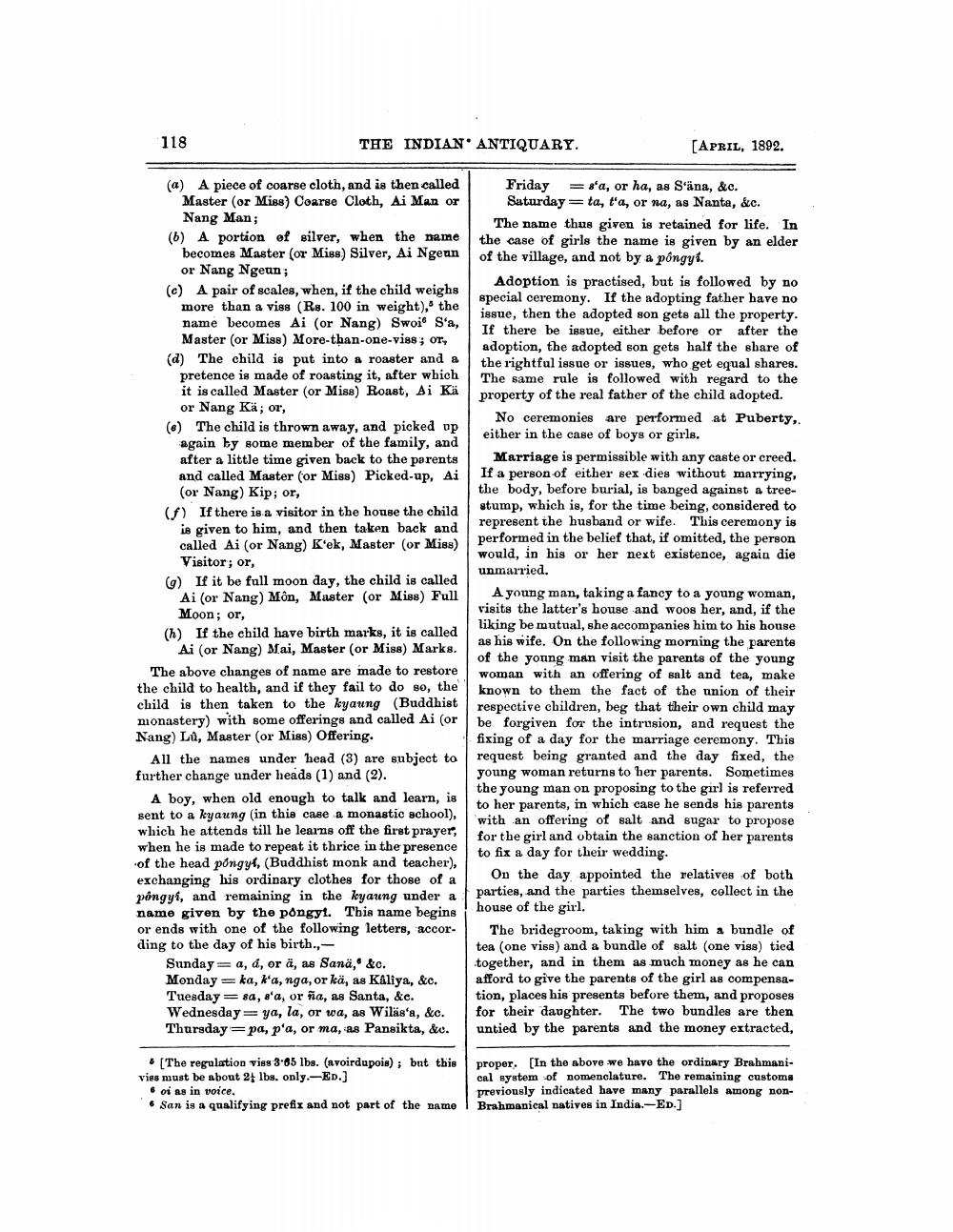________________
118
THE INDIAN ANTIQUARY.
[APRIL, 1892.
(a) A piece of coarse cloth, and is then called
Master (or Miss) Coarse Cloth, Ai Man or
Nang Man; (b) A portion of silver, when the name
becomes Master (or Miss) Silver, Ai Ngeun
or Nang Ngeun; (c) A pair of scales, when, if the child weighs more than a viss (Rs. 100 in weight), the name becomes Ai (or Nang) Swoi S'a, Master (or Miss) More-than-one-viss; OT, (d) The child is put into a roaster and a pretence is made of roasting it, after which it is called Master (or Miss) Roast, Ai Kä or Nang Kä; or, (6) The child is thrown away, and picked op
again by some member of the family, and after a little time given back to the parents and called Master (or Miss) Picked-up, Ai
(or Nang) Kip; or, (f) If there is a visitor in the house the child
is given to him, and then taken back and called Ai (or Nang) Kek, Master (or Miss)
Visitor; or, (g) If it be full moon day, the child is called
Ai (or Nang) Môn, Master (or Miss) Full Moon; or, (h) If the child have birth marks, it is called
Ai (or Nang) Mai, Master (or Miss) Marks. The above changes of name are made to restore the child to health, and if they fail to do so, the child is then taken to the kyaung (Buddhist monastery) with some offerings and called Ai (or Nang) La, Master (or Miss) Offering.
All the names under head (3) are subject to further change under heads (1) and (2).
A boy, when old enough to talk and learn, is sent to a kyaung (in this case a monastic school), which he attends till he learns off the first prayer, when he is made to repeat it thrice in the presence of the head pongyt, (Buddhist monk and teacher), exchanging his ordinary clothes for those of a pôngys, and remaining in the kyaung under a name given by the pongyt. This name begins or ends with one of the following letters, according to the day of his birth.,
Sunday=a, d, or ä, as Sanä, &c. Monday=ka, k'a, nga, or kä, as Kaliya, &c. Tuesday=8a, s'a, or ña, as Santa, &c. Wednesday=ya, la, or wa, as Wilas'a, &c. Thursday=pa, p'a, or ma, as Pansikta, &c.
Friday =sa, or ha, as S'ana, &c.
Saturday=ta, t'a, or na, as Nanta, &c. The name thus given is retained for life. In the case of girls the name is given by an elder of the village, and not by a pôngyi.
Adoption is practised, but is followed by no special ceremony. If the adopting father have no issue, then the adopted son gets all the property. If there be issue, either before or after the adoption, the adopted son gets half the share of the rightful issue or issues, who get equal shares. The same rule is followed with regard to the property of the real father of the child adopted.
No ceremonies are performed at Puberty, either in the case of boys or girls.
Marriage is permissible with any caste or creed. If a person of either sex dies without marrying, the body, before burial, is banged against a treestump, which is, for the time being, considered to represent the husband or wife. This ceremony is performed in the belief that, if omitted, the person would, in his or her next existence, again die unmarried.
A young man, taking a fancy to a young woman, visits the latter's house and woos her, and, if the liking be mutual, she accompanies him to his house as his wife. On the following morning the parente of the young man visit the parents of the young woman with an offering of salt and tea, make known to them the fact of the union of their respective children, beg that their own child may be forgiven for the intrusion, and request the fixing of a day for the marriage ceremony. This request being granted and the day fixed, the young woman returns to her parents. Sometimes the young man on proposing to the girl is referred to her parents, in which case he sends his parents with an offering of salt and sugar to propose for the girl and obtain the sanction of her parents to fix a day for their wedding.
On the day appointed the relatives of both parties, and the parties themselves, collect in the house of the girl.
The bridegroom, taking with him a bundle of tea (one viss) and a bundle of salt (one viss) tied together, and in them as much money as he can afford to give the parents of the girl as compensation, places his presents before them, and proposes for their daughter. The two bundles are then untied by the parents and the money extracted,
6 [The regulation viss 3-65 lbs. (avoirdupois); but this vies must be about 2. lbs. oply.-ED.)
& oi as in voice. 6 San is a qualifying prefix and not part of the name
proper. [In the above we have the ordinary Brahmanical system of nomenclature. The remaining customs previously indicated have many parallels among nonBrahmanical natives in India.-ED.]




